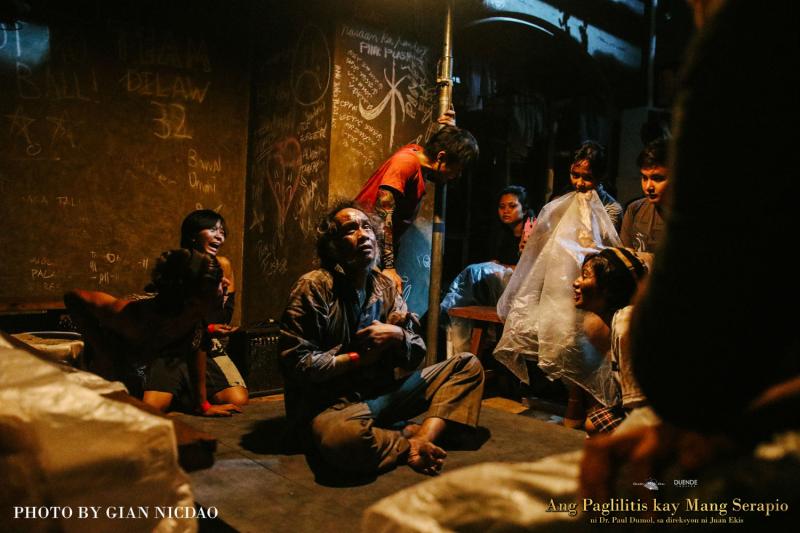Review: ANG PAGLILITIS KAY MANG SERAPIO Reinvigorates A Period Piece Worthy of Acclaim
 He lived a sad life of perversion in a profession of lost causes yet his life's failure was overshadowed when he chose to love, albeit secretly and surreal. This is how one would see Mang Serapio in Theater Titas and Duende Theatre's 50th-anniversary production of "Ang Paglilitis kay Mang Serapio." Written by Dr. Paul Dumol, the play is a timeless social commentary that needs no introduction. As one of the first postmodern plays in the Philippines, its text's tasteful depiction of society, along with all its squalors, signals one to reflect on life in the nakedness of life itself.
He lived a sad life of perversion in a profession of lost causes yet his life's failure was overshadowed when he chose to love, albeit secretly and surreal. This is how one would see Mang Serapio in Theater Titas and Duende Theatre's 50th-anniversary production of "Ang Paglilitis kay Mang Serapio." Written by Dr. Paul Dumol, the play is a timeless social commentary that needs no introduction. As one of the first postmodern plays in the Philippines, its text's tasteful depiction of society, along with all its squalors, signals one to reflect on life in the nakedness of life itself.
Serapio is an old vagrant who is sent to a trial for a crime of caring for a child as it reduces monetary contributions to the "Pederasyon ng mga Pulubi." The cross-examiners subject Serapio to a violent and bloody inquisition culminating in the blinding of the poor beggar.
The play is brutal but does not impose itself on the audience members, though it has that tendency if executed with the wrong interpretation. Here, the actors must be well versed in social circus as well as familiar with the inspiration of the playwright to ensure the play would rise above its normal level of delivery.
This production did its homework as it introduces some new elements to reinvigorate a period piece worthy of acclamation. The message of the play is perfect during its time and setting that is why it would take a lot of tailor-fitting and references to resurrect old witticisms and mix them with new styles to bring about a not so rudimentary production. With so many stagings in the past 50 years, this play has been a mainstay with several theatrical groups, may it be in schools or community playhouses.
What does this production have or lack that can break the monotony then? The answer lies with the actors, the sets, and, most of all, the stage movements.
The actors in this production are part of a pool of raw, interesting talents. If you are in search for relatively new artisans of theater, this play makes it a point to expose a breed that is acceptable in professional theater organizations and various community-based companies. As you watch them move and act on stage, you can see how much training they have endured reaching this level of artistic consciousness. They simply howl for more. The eagerness to perform is there all throughout and their mere presence is felt within the confines of the venue. With this kind of energy, it is but inevitable for some actors to just fire up in their performances. This is a sign of raging desires motivated with a noble purpose of sending multiple messages to the spectators. Refinement is indeed needed if one is for the flawlessness, but if one supports the play's unsettling content and execution, this production is a dazzling jewel of the eyes (but more to the ears).
The stage set is the venue itself and it fits perfectly with the immersive retelling of the whole story. This is seen in some present-day productions but seldom utilized as one miscalculation might entail a spillover that will affect not only the actors but also the audiences who are treated as characters, too. Here, the actors are important not only for playing their roles but also as "willing ornaments" that should not be  distracted easily, especially when the audience member is within arm's reach. Their every movement gives out the message without uttering a single word. This is as important as the spoken lines from the script as the movements depict their own story. In this production, given its limited performance space, the director, Juan Ekis, ensures a performance that is not in utter poverty but is truly wealthy and free-flowing, along with the right amount of gestures mixed with emotional outbursts that do not overkill what the playwright intends to extract in the first place.
distracted easily, especially when the audience member is within arm's reach. Their every movement gives out the message without uttering a single word. This is as important as the spoken lines from the script as the movements depict their own story. In this production, given its limited performance space, the director, Juan Ekis, ensures a performance that is not in utter poverty but is truly wealthy and free-flowing, along with the right amount of gestures mixed with emotional outbursts that do not overkill what the playwright intends to extract in the first place.
In sum, this production of "Ang Paglilitis Kay Mang Serapio" gives a "fair judgment" that could be a benchmark for future productions. This may not be the best version of the classic but it does give us positive prospects at how to further appreciate this theatrical work.
Brought to the stage by Theater Titas and Duende Theatre, the 50th-anniversary production of "Ang Paglilitis Kay Mang Serapio" plays at The Ruins, Poblacion, Makati City, now through September 16, 2018.
Buy tickets (P800-P900) from DIANDRA at (63)917 656 7293.
Photo Credit: Gian Nicdao, Elliot Robles
Reader Reviews

Videos

